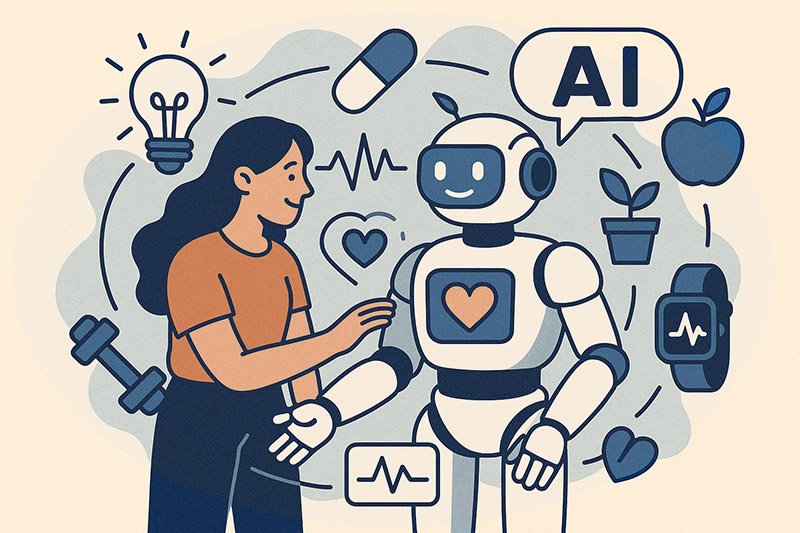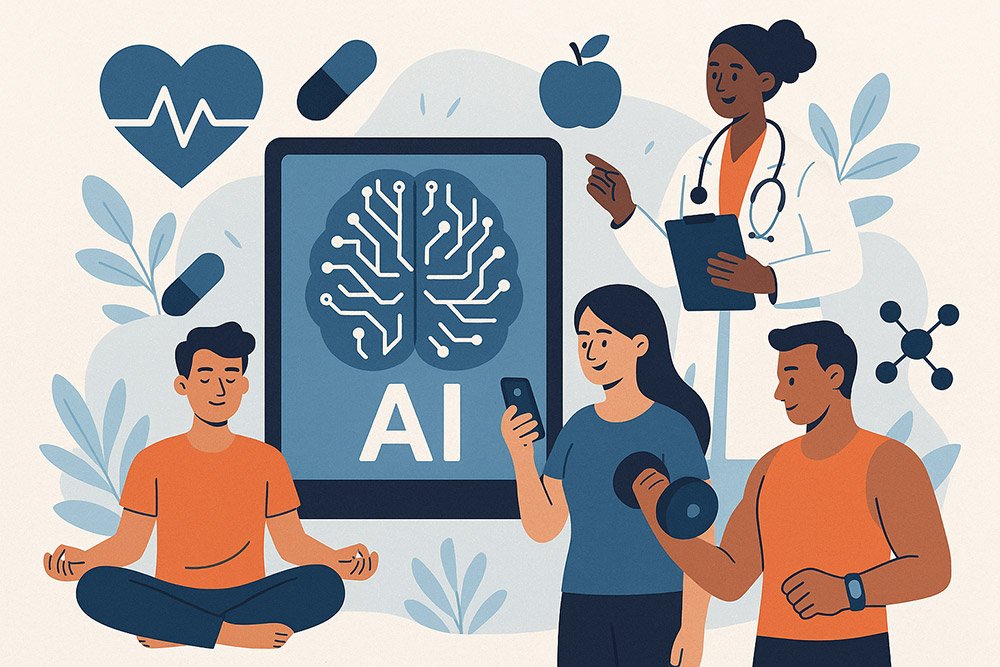How artificial intelligence is transforming the way we move, heal, and thrive.
Table of Contents
I. Welcome to the Age of AI for Health
Imagine waking up to a world where your watch quietly tracks your sleep patterns, your phone reminds you to hydrate, and your doctor already knows what your lab results will look like before the test even begins.

Welcome to the new frontier of AI for health, a realm where technology isn’t replacing people, but empowering individuals to take control of their health, making life healthier, more personalized, and, quite simply, better.
Artificial intelligence has stepped beyond diagnostics and data crunching. It’s now coaching us through workouts, managing chronic conditions, analyzing nutrition, and, importantly, offering emotional support when we need it most, making us feel understood and cared for.
This guide explores the best AI for health and wellness, what it is, how it works, and the extraordinary ways it’s reshaping the future of care, prevention, and daily living.
II. What Exactly Is AI for Health and Wellness?
When people hear “AI,” they often picture robots. But in health, AI is less about machines and more about intelligence. It’s software that learns from vast amounts of data by spotting trends, predicting outcomes, and suggesting solutions we might never have considered.
Here are the key ingredients behind the movement:
- Machine Learning (ML): Algorithms that learn from experience. The more patient data or activity logs they process, the more accurate their predictions become.
- Deep Learning (DL): A subset of ML that mimics the human brain’s neural networks. It can analyze complex information like MRIs, X-rays, or ECG readings to detect subtle abnormalities.
- Natural Language Processing (NLP): Enables computers to understand human speech and text, making chatbots, transcription tools, and clinical note analyzers possible.
- Computer Vision: Gives computers “eyes” to read medical images, identify moles, or even detect fatigue in your face.
Together, these technologies form the invisible scaffolding of AI for health, quietly improving everything from your morning run to your next doctor’s appointment.
III. A Short History of AI in Healthcare
The story of AI in medicine is one of patience and progress.
- 1950s–1970s: Researchers built early “expert systems” like MYCIN and INTERNIST-1, which used rule-based logic to suggest diagnoses. Primitive, but revolutionary.
- 1980s–1990s: Machine learning began to replace rigid rules with experience-based models. Electronic Health Records (EHRs) created a treasure trove of data for analysis.
- 2000s–2010s: The Human Genome Project unleashed vast genetic datasets. IBM Watson famously beat humans on Jeopardy! and later applied its reasoning to cancer care.
- 2020s–Now: Welcome to the generative era. AI doesn’t just analyze data; it creates — drafting patient notes, designing drugs, predicting diseases, and assisting surgeons in real time.
Every step of this evolution has led to one truth: AI for health is becoming a fundamental partner in care delivery, prevention, and personal empowerment.
IV. The Big Benefits: Why AI for Health Matters
Why does it matter? Because it’s changing how we think about health itself.
1. Early Detection and Prevention
AI can recognize patterns invisible to the human eye. From predicting heart disease risk to detecting breast cancer earlier, it’s making early intervention the norm, providing a sense of security and reassurance.
2. Hyper-Personalized Care
No more “one-size-fits-all.” AI tailors fitness, nutrition, and medication to your unique biology, lifestyle, and goals.
3. Efficiency and Accessibility
Doctors spend up to half their time on paperwork. AI automates documentation and scheduling, giving them more time for what truly matters — patients.
4. Wellness Beyond the Clinic
AI is now part of our homes and routines — guiding workouts, tracking recovery, analyzing sleep, and even offering real-time mental health support.
V. Top 10 Best AI for Health Tools & Apps
If you’re curious where to start, here’s a curated list of the best AI for health and wellness tools across different categories — each one shaping the future of how we care for ourselves.
1. Best for Mental Health: Wysa & Woebot
These conversational AI chatbots offer evidence-based emotional support and cognitive behavioral therapy techniques, available 24/7 right from your phone.
2. Best for Fitness Tracking: Fitbit & Oura Ring
These smart wearables use AI to track heart rate, recovery, sleep cycles, and daily activity — then turn that data into actionable insights.
3. Best for Nutrition & Lifestyle: MyFitnessPal & Lumen
MyFitnessPal uses AI to tailor meal recommendations, while Lumen’s sensor analyzes your breath to determine how efficiently your body burns fuel.
4. Best for Symptom Checking: Ada Health & Buoy
Both tools act like digital triage assistants, asking questions and using AI to suggest possible causes and next steps before you visit a doctor.
5. Best for Chronic Conditions: Livongo & Omada Health
These platforms help people manage diabetes, hypertension, and other chronic conditions through AI-guided monitoring and coaching.
6. Best for Women’s Health: Moody Month & Clue
AI algorithms personalize hormone tracking and mood patterns to help women better understand their cycles and wellbeing.
7. Best for Sleep & Recovery: SleepSpace & Eight Sleep
Smart mattresses and sleep apps that analyze rest quality and adjust temperature or soundscapes for optimal sleep.
8. Best for Professional Support: Headspace Care & Lyra Health
Combining human therapists with AI insights, these programs match users with personalized mental wellness plans.
9. Best for Remote Monitoring: Biofourmis & Current Health
Clinicians use these platforms to track patients’ vitals remotely, spotting potential complications before they become emergencies.
10. Best for Research & Innovation: Google Health & DeepMind
Google’s AI models can detect conditions like diabetic retinopathy and breast cancer with remarkable accuracy, while DeepMind’s work in protein folding is accelerating medical breakthroughs.
Each of these represents the promise of AI for health — accessible, intelligent, and increasingly indispensable.
VI. Challenges & Ethical Considerations
Of course, with innovation comes complexity.
- Data Privacy: Health data is deeply personal. Storing and sharing it safely remains a significant challenge.
- Algorithmic Bias: AI learns from existing data — and if that data carries bias, so will the system.
- Transparency: Understanding how AI reaches conclusions is vital for trust.
- Empathy & Humanity: Even the most intelligent machine can’t replicate compassion, the heart of proper healthcare.
The best AI for health doesn’t just deliver accuracy; it ensures fairness, privacy, and accountability.
VII. The Future of AI for Health & Wellness
The next wave of AI for health will make today’s tools feel quaint.
- Digital Twins: Imagine a virtual model of you that simulates how your body reacts to different treatments.
- Predictive Analytics: AI will soon warn you of potential illnesses years before symptoms appear.
- Virtual Hospitals: Remote consultations and at-home monitoring will become the default for many conditions.
- AI in Surgery: Precision robotics guided by real-time analytics is already improving outcomes.
- Ethical AI: Expect global frameworks that ensure these technologies benefit everyone equally.
It’s not just about curing disease — it’s about reimagining wellness itself.
VIII. Choosing Wisely: Finding Your AI Health Companion
Not all AI health tools are created equal. Here’s how to choose safely and wisely:
- Transparency: Look for clear explanations of how your data is used.
- Evidence-Based: Prioritize apps backed by clinical studies or medical oversight.
- Human Oversight: AI should assist, not replace, qualified professionals.
- Data Protection: Choose platforms with strong encryption and compliance with HIPAA or GDPR.
- Personal Fit: The best AI for health is the one that genuinely supports your lifestyle and comfort level.
IX. Final Takeaway: Smarter Tech, Healthier Humans
AI for health isn’t about creating robotic doctors or replacing human empathy. It’s about enhancing what we already do best, like listening, learning, and healing.
From mental wellness chatbots to predictive diagnostics, the best AI for health is helping humanity make a giant leap, not away from compassion, but closer to it.
The future of wellness is here. It’s intelligent, intuitive, and designed for people just like you.








